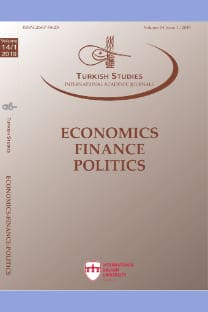Uluslararası İşletmecilik Perspektifinden Politik Risk: Türleri, Değerlendirilmesi ve Yönetimi
Political Risk from the Perspective of International Business: Types, Assessment and Management
___
- Ajami, R. A., Cool, K., Goddard, G. J., & Khambata, D. (2006). International business: Theory and practice. USA: ME Sharpe.
- Aswathappa, A. (2008). International business. New Delhi: Tata McGraw-Hill.
- Austin, J. (1996). Risk and real estate investment: An international perspective. Journal of Real Estate Research, 11(2), 117-130.
- Baas, D. (2010). Approaches and challenges to political risk assessment: The view from export development Canada. Risk Management, 12.
- Beeman, D. R. & Taoka, G. M. (1991). International business: Environments, institutions, and operations. USA: Harpercollins College Div.
- Best, A.M. (2019). Market Segment Report http://www3.ambest.com/bestweekpdfs/sr516553119175bfull.pdf, Erişim Tarihi 03.01.2020.
- Can, E. (2012). Uluslararası işletmecilik teori ve uygulaması. İstanbul: Beta Yayınevi.
- Collinson, S., Hodgetts, R. M., Rugman, A. M (2006). International Business. England: Pearson Education.
- Correia, R., Población, J. & Restrepo, D. (2012). Political risk and corporate investment decisions. Universidad Carlos III de Madrid, Departamento de Economía de la Empresa, Madrid.
- Costa, L. P. D. S., & Figueira, A. C. R. (2017). Political risk and internationalization of enterprises: A literature review. Cadernos EBAPE BR, 15(1), 63-87.
- Czinkota, M., Ronkainen, I. (2013). International marketing. USA: Cengage Learning.
- Çavuşgil, S. T., Knight, G., Riesenberger, J. R., Rammal, H. G. & Rose, E. L. (2008). International business. Australia: Pearson.
- Çilingir, S. (2004). Doğrudan yabancı sermaye yatırımlarında politik risk ve türkiye açısından değerlendirmesi. Yüksek lisans tezi, Dokuz Eylül Üniversitesi.
- Daft, R. D. (2010). Management. USA: Cengage Learning EMEA.
- DEİK, (2011). 10 soruda politik risk sigortası. İstanbul. Erişim Tarihi: 10.08.2015 https://www.deik.org.tr/Contents/FileAction/3541.
- Dess, G. G. & Miller, A. (1996). Strategic management. USA: Mc Graw-Hill.
- Doz, Y. L. & Prahalad, C. K. (1980). How MNCs cope with host-government intervention. Harvard Business Review, 58(2).
- Goyal, A. & Goyal, M. (2011). Business environment. India: FK Publications.
- Günal, M. (2006). Para, banka ve finansal sistem. Ankara: Yeni Dönem Yayıncılık.
- Haendel, D. (2018). Foreign investments and the management of political risk. USA: Routledge.
- Hernández Gutiérrez, J. C. (2019). The political risk analysis. International Security Studies Group, 1-16.
- Hollensen, S. (2007). Global marketing: A Decision-oriented Approach. United Kingdom: Pearson Education.
- Hollensen, S. (2014). Global marketing. United Kingdom: Pearson Education.
- Hub Guides. (2013). http://outhwaiteandchavda.com/public/guide%20to%20diversification.pdf, Erişim Tarihi: 02.01.2020).
- John, A., & Lawton, T. C. (2018). International political risk management: Perspectives, approaches and emerging agendas. International Journal of Management Reviews, 20(4), 847-879.
- Karabay, M. (1997). Uluslararası inşaat sektöründe politik risk ve bulanık kümeler yardımıyla analizi için bir yöntem önerisi. Doktora Tezi, İstanbul Teknik Üniversitesi, Fen Bilimleri Enstitüsü, İstanbul.
- Lee, K., & Carter, S. (2012). Global marketing management. UK: Oxford University Press.
- Loikas, A. (2003). A government analysis of political risk: exploring equilibrium, instability and pluralism at the local, national and supranational level in Europe, Turku School of Economics and Business Administration, Finland.
- Mayer, H. (2017). Political risk insurance and its effectiveness in supporting private sector investment in fragile states. The LSE-Oxford Commission on State Fragility, Growth and Development. https://www.theigc.org/wp-content/uploads/2018/05/Political-riskinsurance. pdf
- Mckellar, R. (2010). A short guide to political risk. United Kingdom: Gower Publishing, Ltd.
- Menipaz, E., & Menipaz, A. (2011). International business: Theory and Practice. USA: Sage.
- MIGA. (2013). World Investment and Political Risk. https://www.miga.org/ documents/WIPR13.pdf.
- Musonera, E. (2008). Country risk factors: An empirical study of fdı determinants in SSA. Journal of International Management Studies, New Mexico.
- Onkvisit, S., & Shaw, J. (2004). International marketing: Strategy and theory. London: Routledge.
- Robock, S. H. (1971). Political risk: Identification and assessment. Columbia Journal of World Business, 6(4), 6-20.
- Robock, S. H., Simmonds, K. & Zwick, J. (1989). International business and multinational enterprises. Irwin: Homewood, IL.
- Root, F. (1972). Analyzing political risks in international business. The Multinational Enterprise in transition. USA: Darwin Press.
- Root, F. R. (1987). Entry strategies for international markets. USA: Lexington Books.
- Simon, J. D. (1982). Political risk assessment: Past trends and future prospects. Columbia Journal Of World Business, 17(3), 62-71.
- Simon, J. D. (1984). A theoretical perspective on political risk. Journal of International Business Studies, 15(3), 123-143.
- Suder, G. (2009). International business. India: C&M Digitals.
- Sun, M. H., & Liu, H. T. (2018). An exploration of how political risk components affect the stock volatility considering ICRG and GARCH Model. In 4th Annual International Conference on Management, Economics and Social Development.
- Zembri-Mary, G. (2019). Project risks: Actions around uncertainty in urban planning and infrastructure Development. USA: John Wiley & Sons.
- https://icsid.worldbank.org/en/Documents/ICSID_AR19_EN.pdf, Erişim Tarihi: 02.01.2020.
- http://www.hurriyet.com.tr/ekonomi/lahey-mahkemesi-rusya-ya-50-milyar-dolar-ceza-kesti- 26905261, Erişim Tarihi: 02.01.2020.
- http://www.mfa.gov.tr/uluslararasi-yatirim-anlasmazliklarinin-cozum-merkezi-_internationalcentre- for-settlement-of-investment-disputes-icsid_.tr.mfa, Erişim Tarihi: 03.01.2020.
- http://www.ntv.com.tr/ekonomi/fransa-ve-belcika-rusyanin-mal-varliklarina-el-koyma-kararialdi, FxcOWzz6okyNWfiZUHieyw, Erişim Tarihi: 04.01.2020.
- ISSN: 2667-5625
- Yayın Aralığı: Yılda 4 Sayı
- Başlangıç: 2006
- Yayıncı: ASOS Eğitim Bilişim Danışmanlık Otomasyon Yayıncılık Reklam Sanayi ve Ticaret LTD ŞTİ
The Relationship Between Unemployment and Economic Growth in OECD Countries: Panel Causality Test
Avrasya Ekonomik Birliğinde Çevresel Kuznets Eğrisi Hipotezinin Geçerliliği: Panel Veri Analizi
Mehmet ORHAN, Hakan ALTIN, Mehmet AYTEKİN
İşletmelerin Borsa Performansını Etkileyen Finansal Oranların Belirlenmesi
Kamu Personeli Tarafından İşlenen Zimmet Suçlarına Yönelik Türkiye Genelinde Bir Araştırma
OECD Ülkelerinde Ticari Açıklık Yakınsaması: Phillips-Sul Kulüp Yakınsama Analizi
Zerrin KILIÇARSLAN, Melike DEDEOĞLU
Determinants of Bank Credit in Turkey: An Autoregressive Distributed Lag (ARDL) Approach
Are Female Employees Temporary Workers? A Study on Female’s Job Attitude and Intention to Quit
Determination of Significant Financial Ratios That May Influence Business Stock Performance
